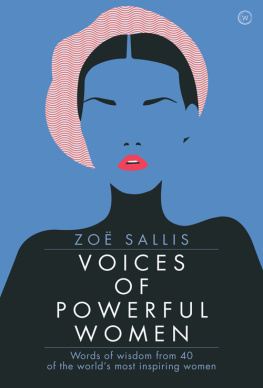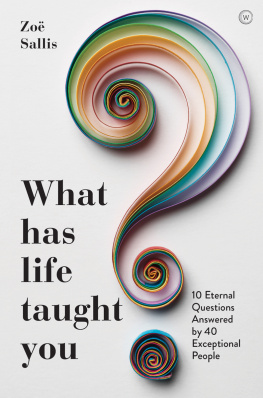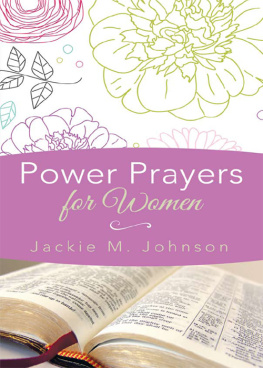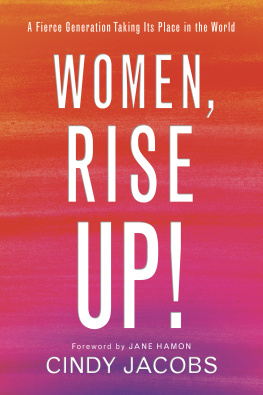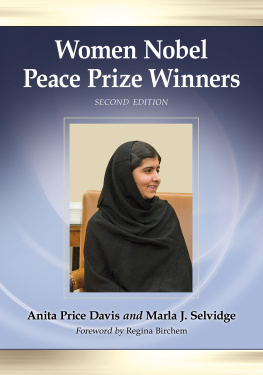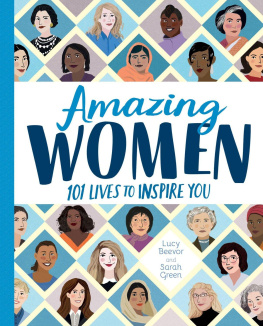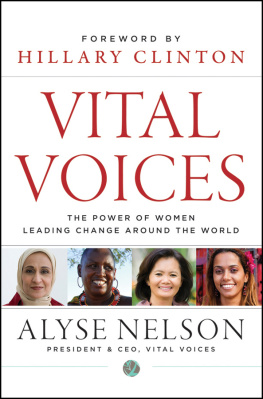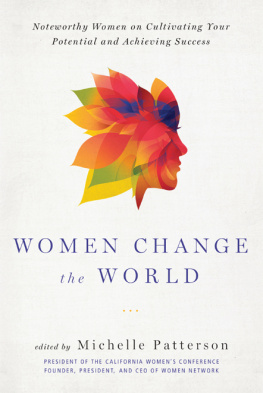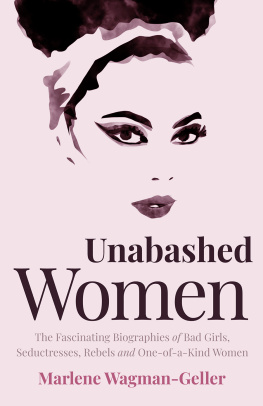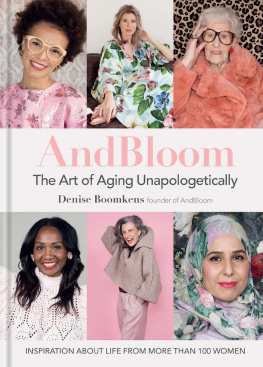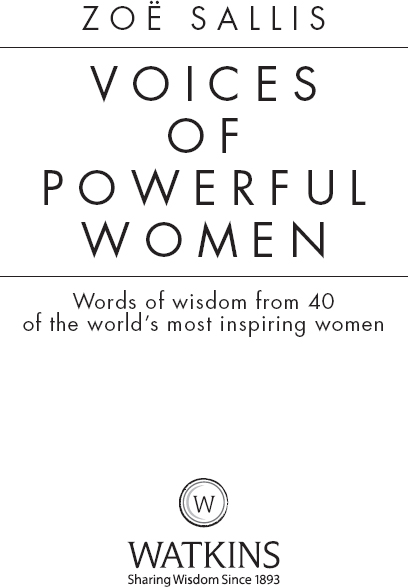Remarkable questions answered by remarkable women. This book shows us that across differences in ages, cultures, races, and religions, we are still more alike than we are unalike. A fascinating collection!
MAYA ANGELOU
Award-winning poet, memoirist and civil rights activist
At a time in history when we all need hope and solidarity, this book brings to us the voices of women whose lives exude such hope. Their words of courage and love give us all the confidence to reach into our own hearts and find our own courage and love to meet the challenges of life.
MAIREAD MAGUIRE
Nobel Peace Prize winner and founder of Peace People
Zo Sallis has assembled a brilliantly starry lineup for her book. Whats more she has elicited from them many unexpected and revealing insights, which tell us so much about how the worlds most distinguished women see their lives and the lives of their less fortunate sisters. A magnificent achievement.
DAME ANN LESLIE
Award-winning journalist and broadcaster
This book is dedicated to my grandchildren.
The future belongs to those who believe in the beauty of their dreams.
ELEANOR ROOSEVELT
CONTENTS
INTRODUCTION
One isnt necessarily born with courage, but one is born with potential. Without courage, we cannot practise any other virtue with consistency. We cannot be kind, true, merciful, generous, honest.
MAYA ANGELOU
I have interviewed some extraordinary women for this book, and been deeply moved by their answers to the questions I put to them. One of the things they certainly share is courage. It was Albert Einstein who said, The world is a dangerous place. Not because of the people who are evil, but because of the people who dont do anything about it.
All the women in this book are doing something about it, something that makes a difference. Whether they are in the public eye as activists, artists, performers, lawyers, presidents, or are simply humanitarians working behind the scenes, all of them have inspired and encouraged me in my own life. They prove again and again that the centuries of struggle to gain independence and equality for women are coming to an end, in all fields and in many countries. The great women of the past and there have been many had more to contend with than we do. Yet many of us still feel that it is too hard to accomplish our goals, or hesitate to act because we fear that we might fail. We forget that everything starts with a single, small step.
Professor Wangari Maathai, the first African woman to receive the Nobel Peace Prize, sometimes quoted a story about this. It is about a huge fire that broke out in a forest. All the threatened animals were scared, and fled, except the hummingbird, who decided to stay and put out the fire. It flew to the nearest river and picked up a few drops of water, then came back and put them on the fire. The other animals watched from a distance and made fun of the hummingbird. The more they mocked, the harder the hummingbird worked, persistently and patiently bringing its little drops of water to put out the fire. They asked, What are you doing? The fire is overwhelming, how can you make a difference? You are too little anyway. The hummingbird answered, I am doing the best I can.
Aspiration, not necessarily achievement, is what shows us the heart and mind of a person, and it can touch and move those who have the power to change things. My hope is that this book will inspire and motivate everyone who reads it, man or woman, to do the best they can for the human family and the world we live in.
ZO SALLIS
DID YOUR UPBRINGING OR EARLY EXPERIENCES
INFLUENCE THE DIRECTION YOUR LIFE TOOK?
Jane Fonda
I think what influenced me the most was movies that my father was in. Things like The Grapes of Wrath and 12 Angry Men and Young Mr Lincoln and The Ox-Bow Incident. My father was a very remote person who never spoke a lot to us, but the roles he played in these films communicated certain values to me. I once asked Martin Luther Kings daughter Yolanda if her dad took her on his knee and told her about values, and she said that he never did. And I said my father didnt either, but that she had Martin Luthers sermons and I had my fathers films. Thats where the values came from.
Where it got to be a problem was in the 60s and 70s with the Vietnam War. I became an activist, and this generational split occurred in the family. My father wasnt Clarence Darrow, or Tom Joad or Abraham Lincoln, characters he played and aspired to be. There was a contradiction between who he actually was and who the roles portrayed him as. It was a shock to me as a young activist to realize that I was going further than he would. He would vote for a candidate that wanted to end the war, but he wouldnt march with me.
Jung Chang
My childhood was dominated by the fact that I grew up under Mao. My family life, like that of every Chinese person at the time, was completely turned upside down. This is of course one of the reasons I came to write Maos biography, having already related our family story in my previous book, Wild Swans. Both books were prompted by my direct experiences.
I realize that compared to most people in China when Mao came to power, I at first had a very privileged life, as both my parents were communist officials. Therefore, I didnt really suffer much in the great famine in China between 1958 and 1961 in which nearly 40 million people died of starvation and overwork. But I certainly suffered under Mao during the ten-year period of the Cultural Revolution. My parents were denounced, resulting in my fathers death. He had been tortured, and forced to burn his beloved library. My dear grandmother died and I was exiled to a bleak area of the Himalayas to work as a peasant, a barefoot doctor, a steel worker and an electrician. Yet eventually I became one of the very few Chinese people to achieve a university education at that time. Mao had closed down the countrys schools and universities for years and a whole generation of philistines was created. When he died in 1976, some limited scholarships for study abroad were awarded on an academic basis. I was in one of the first groups of 14 people allowed to come to the West to study. So although I suffered along with most Chinese people, I was also very lucky.
Maya Angelou
I am sure the events Ive lived through did influence the path my life took. I was raised by a grandmother, my fathers mother, who was an incredible woman. Imagine at the turn of the last century a black woman in a little village in Arkansas who has gone through the 4th grade, has had her husband leave her with two children, and just teaches herself and builds up a business making chicken pies that she sells to workers in the only big places in town a cotton gin and a lumber mill. She would cook the pies all night and carry them to the cotton gin where she fried them on a brazier, and then ran five miles to the lumber mill to sell the rest. Rain and snow didnt matter. She built up a custom like that, and in about ten years started a merchandise store between the two patronages. I loved to imitate her, and people would say, Oh Mrs Henderson, I see youre with your shadow, and she would look at me and smile, Yes, she must be my shadow. Where I go, she goes. Where I stop, she stops. She loved me.
My grandmother would cook the pies all night and carry them to the cotton gin where she fried them on a brazier, and then ran five miles to the lumber mill to sell the rest. Rain and snow didnt matter.
MAYA ANGELOU
Benazir Bhutto
The direction my life took was very much influenced by my upbringing. I was fortunate to have a father who believed that a daughter and a son must have equal rights. This was not usual in Pakistan when I was growing up. Pakistan was a traditional society. Girls were expected to get married, boys were expected to get a job and look after not only themselves but other members of their family. The emphasis was on making sure that the boys got the good education the good food. The girls basically got the leftovers. My father was different. He was an educated and emancipated man and he brought us up to believe in gender equality. Had it not been for him, perhaps I would not have been so dedicated in my commitment to womens rights and womens empowerment. It was my father who decided that he would send me abroad for education when I was 16. I became very independent when I was in the States, but at first I felt I had been thrown into the deep end of a pool, and had to swim or sink. I found it quite shocking that students went to class in jeans, often dirty jeans and a t-shirt, and would put their feet up on the desks and answer the teachers back, but it was a real awakening for me.
Next page
